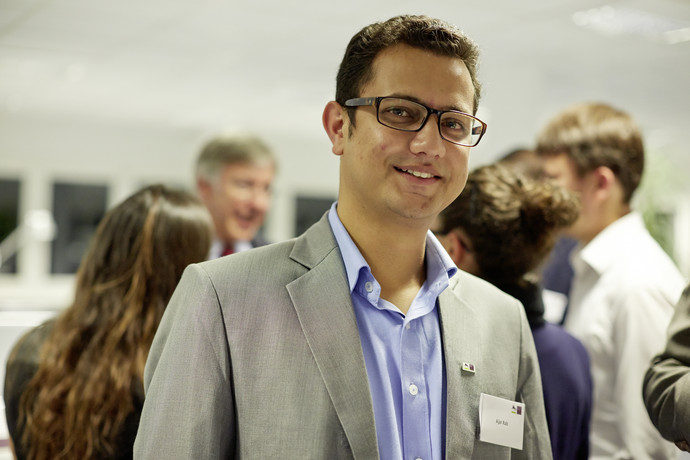Ajar Rab graduated from National Law School Of India University, Bangalore(2006-2011). At present, he is a partner at Rab & Rab Associates LLP, Dehradun and his work ranges from civil litigation, arbitration and corporate transactions.
He is also an international policy consultant at Lexidale and a Non-Resident Expert at Vidhi where his work includes review of existing laws, policies and regulations, drafting of policy documents, amendments, rules and regulations and research on comparative policy.
In this interview he talks to us about:
- His experience at NLS, Bangalore.
- His decision to pursue with a dual degree- LL.M. and MBA from Germany.
- Skills one must require to become a legal consultant.
- His views on how Indian Universities may improve the education regime.
How would you like to introduce yourself? Tell us a bit about your childhood and pre-college life.
I am a lawyer who grew up in the small hill station of Mussoorie where I studied at St. George’s College. My school lay great emphasis on extra-curricular activities and I was an active debater and loved playing sports. I was very lucky to find good friends with whom I have the fondest memories.
What motivated you to choose law as a career?
My parents are also lawyers. My father is a designated senior advocate at the High Court and my mother has spent over 37 years at the trail courts. I guessed I absorbed things like a sponge, never really seeing the big picture directing my interest in law. Though my parents never told me to become a lawyer, somehow their experiences and narrations about court cases and clients generated a keen interest in law.
Please share your experience at National Law School of India University, Bangalore, especially as the first student to be elected as President of the Student Bar Association in absentia.
I feel very lucky and privileged to have had a chance to study at NLS Bangalore. The place changed me for the better and I feel I am an entirely different person, pre and post college. One of my seniors, Nizam Pasha, who was in his final year when I joined, told me “Law School is a land of opportunity” and I don’t think I have better words to describe the place.
My election to the SBA, while I was on exchange, was sheer benevolence of my batch and my close friends. I am truly grateful to all of them for believing and in me and convincing the others who did not at the time. My term at the SBA was full of various highs and lows. I have no hesitation to admit that it changed my world view forever. I learnt a lot about strategy, politics, negotiation and public perception – something we have to deal with daily as lawyers.
Why did you decide to pursue higher studies? What was your motivation?
Working for the general corporate team at Amarchand, I developed an interest in corporate law and transactions. During my time at law school, I always believed I wanted to do only litigation but after working for year, I realized I did not know enough about transactional lawyering so I wanted to pursue higher studies to educate myself.
Why did you pursue with a dual degree- LL.M. and MBA from Germany? Why Germany and not some IVY League University?
I chose the Master of Law and Business program at Bucerius Law School/WHU Otto-Beisheim School of Management, which to my mind, was a unique blend of law and business management, geared towards international commercial transactions. The faculty profile included some of the biggest names in academics and industry and the course outlines were structured as practical applications of concepts rather than mere theory. I guess that seemed like the right fit to learn more about the ins and outs of transactions, both from a legal as well as a commercial perspective.
Do you think that the Indian Law Universities need a change to match up to the standards of foreign Universities? What can be done in order to make NLUs more conducive for learning? How do you think Indian Universities may improve the education regime?
Definitely, the gap between Indian Law Universities and foreign universities is quite big. I feel our traditional style of classroom instruction is out dated with the dynamic application of concepts we learn in class. Exercise oriented class room discussions are far more fruitful for understanding the theory and applying them. At my masters, our professors gave us case studies which are used in IVY league institutions and we were tested on our analysis and conclusions, rather than simply answering theoretical questions in an examination. I think our universities can adopt a similar approach, but my caveat is that our system of school education should also change to accommodate that kind of learning.
What are the skills one must acquire to become a legal consultant?
I think every lawyer is a legal consultant to some extent. The distinction here is more on lawyers who handle litigation in Courts and those that are involved at policy levels or at the level of legal strategy. I don’t think the skills required to become a legal consultant are very different or unique, just that as a consultant, especially a policy consultant, needs to have the broader picture in mind with respect to the ramifications of their advice in various areas.
Share your work experience as the first law firm of Uttarakhand.
I consider myself lucky that our firm has had very versatile experience, in terms of the nature of work and the kind of clients. It is not so say that we did not struggle at the beginning but my seniors and friends have been very kind to refer various matters and as a result though it has been only 5 years since my brother setup the law firm, we have represented some of the biggest names in the country such as the Aditya Birla Group, Birla Tyres, Hyatt group of hotels, Rakesh Roshan, Viom Networks etc., for litigation as well as corporate transactions.I guess the cliché holds true “I get by with a little help from my friends”.
What were the reasons behind leaving Amarchand&Mangaldas and moving to Dehradun?
I learnt a lot at Amarchand but left to pursue my masters. Moving back to Dehradun is a question I am regularly asked about and have been defending since the time I left Amarchand. My brother had already setup a law firm,Uttarakhand was a promising State and there was scope of transactions here. With my experience, I felt moving back would add to our areas of practice and we will be able to service clients within Uttarakhand and outside if we provide quality legal advice.
What kind of work you are entrusted with as a non-resident expert?
My stint with Vidhi has been brief but I was part of a team which was drafting amendments to the Food Safety Act and its Rules.
Many law students aspire to secure a job. What do you think most are doing wrong, from your observation? Please give our readers some tips to nail an interview.
I think sometimes we tend to over sell ourselves and also forget that the person who is interviewing us has also been on the other side of the table. There is no substitute for sincerity and honesty in an interview. One other thing is that students tend to estimate their value by the size of the pay package being offered. I don’t think that is necessarily true. A pay package is a management decision considering various other aspects and costs than just someone’s qualifications and value. Moreover, freshers applying for a job tend to forget that even though they did really well in law school, practicing law in real life is a different ball game altogether – an experience they definitely lack. The aim early-on should to be take a job which allows maximum exposure and experience, rather than a fat pay cheque.
Lastly, what would be your message to our readers who are mainly young lawyers and law students?
Law is a field which requires immense patience and experience. We all aspire to be like Mr. Nariman, Mr. Singhvi or Mr. Rohtagi, but we forget how long they have been in practice. They have a name and charge a fee after decades of being in practice. Students today tend to want a similar lifestyle straight out of law school, which leads to frustration. If the aim is to grow your knowledge of law day-by-day, be better lawyers and work towards your clients’ best interests with utmost dedication, I think we all may land up being where the big names are, but only in due time.
























